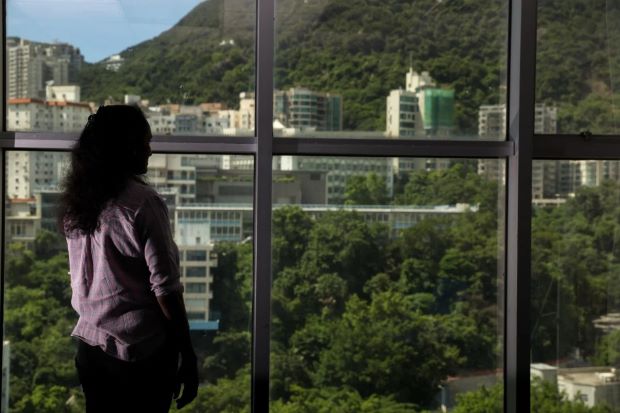‘No one to help’
Sri Lankan migrant workers in Hong Kong lack support, face exploitation and abuse, NGOs say
By Connor Mycroft
HONG KONG – When Gita* came to Hong Kong in 2018 to start life as a domestic helper, she just wanted to support her three children back home in Sri Lanka as her husband was unable to work after an injury.
For the next 17 months, however, she found herself living a nightmare.
She claimed her employer, a woman, yelled at her, ridiculed her and beat her repeatedly. Once, the woman pushed her into a corner and tried to choke her, she said.
One night in 2019, she finally mustered the courage to flee her employer’s home, with nothing but her phone and the clothes on her back.
Gita remained in Hong Kong for almost four years more, during which she relied on support from NGOs, charities and shelters.
At first, she did not know where to get help. Then local charity Branches of Hope helped her as she pursued her claims against the employer, a process which dragged on and ended in disappointment as no conclusion was reached.
So much time had passed, she had no proof of her injuries and the case stalled over conflicting claims by Gita and her employer. The employer moved to a new address and was no longer able to be contacted.
Last summer, Gita returned to Sri Lanka.
“I am filled with regret and sadness,” she told the Post. “The memory is so painful for me.”
Although Sri Lankans make up only a tiny fraction of foreign domestic workers in Hong Kong, NGOs say they have been seeking assistance with increasing frequency in recent years.
Unlike the Indonesians and Filipinos who made up most of the city’s foreign helpers, they said, Sri Lankans lacked a strong local support network and a full consular mission.
For the past two years, Sri Lankans have made up about a third of the clients in Branches of Hope’s ‘Stop Trafficking of People’ program.
Executive director Alexander Pforte said many of them experienced “significant labour rights violations”, such as dangerous working conditions and being forced to work in unrelated industries.
Some men were made to work at construction sites and women were trafficked into prostitution. Those caught working illegally faced jail time and repatriation.
According to the latest Immigration Department data, Hong Kong was home to about 356,000 foreign domestic helpers as of the end of last year, with 1,126 Sri Lankans making up less than one per cent of the total. Almost 200,000 Filipinos and close to 148,000 Indonesians were living in the city.
Although Sri Lankans had been coming to Hong Kong to work for several years, Pforte said the unstable situation in their home country in recent years had driven more to seek jobs overseas.
According to Sri Lanka’s Ministry of Labour and Foreign Development, the number of citizens who left to work abroad rose from about 250,000 a year to more than 311,000 in 2022, when the country declared bankruptcy and was gripped by anti-government protests and political turmoil.
Although Sri Lanka has an honorary consulate in Hong Kong, its citizens do not have the advantage of full representation by officials from their country.
Pforte said their small numbers meant Sri Lankans lacked community self-help groups and faced language difficulties in finding the services they needed in an emergency.
All of this made them more vulnerable to abuse and exploitation, he said.
He urged the Hong Kong government to commit more resources to tackling the problems Sri Lankans faced in the city.
Foreign domestic helper Mary* said she learned about the lack of consular support while undergoing training in Sri Lanka before arriving in Hong Kong in 2016.
“I was told there would be no one to help me if I needed it,” she said.
For six years, she was made to work long hours, on holidays, not given annual leave and was underpaid, but she stayed with her employer because she needed the money and did not know who to turn to for help.
In 2022, another Sri Lankan pointed her to Help for Domestic Workers, an NGO, which helped her take her case to the Labour Department where she was awarded HK$23,000 (US$2,940) for unpaid entitlements.
Domestic workers in Hong Kong are entitled to a monthly minimum wage of HK$4,870 and a food allowance of HK$1,236 per month which Mary said she never received.
Rachel Li, Help for Domestic Workers’ head of case management and research, said the charity had also been seeing more Sri Lankan clients in recent years.
She said accessible information and translation services offered in Sinhala and Tamil – the two main languages of Sri Lanka – were lacking, which meant many were left unaware of their rights including how to seek legal redress.
The government had brochures in Sinhala, but Li said the formal language used was hard for many Sri Lankans to understand.
“It’s a big issue,” she said.
Responding to queries from the Post, the Labour Department said: “The government is committed to upholding and safeguarding the rights and benefits of foreign domestic helpers working in Hong Kong, including those from Sri Lanka.”
Aside from its 24-hour hotline for domestic helpers, it said its informational publications were offered in Sinhala, and the department held regular briefings to tell helpers about their rights.
The department also welcomed Sri Lankan foreign domestic helpers “to share with us their suggestions on the publicity material”.
*Names changed at interviewees’ request
-scmp.com.



Comments are closed, but trackbacks and pingbacks are open.